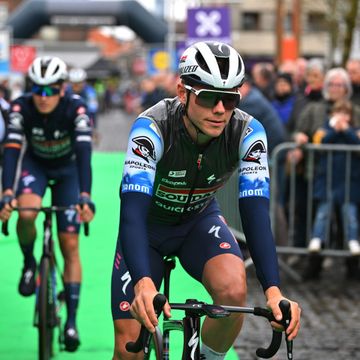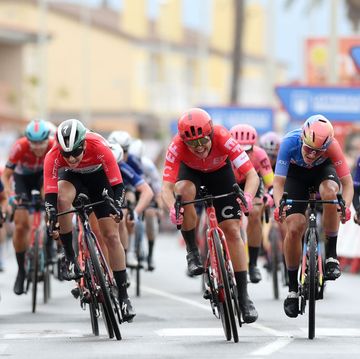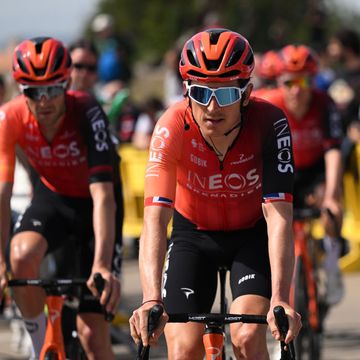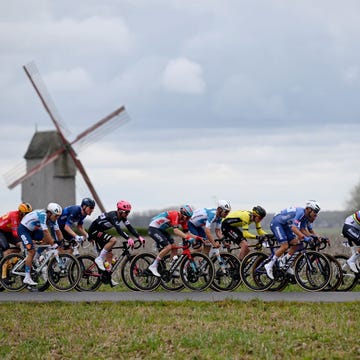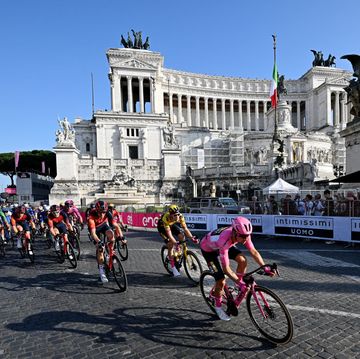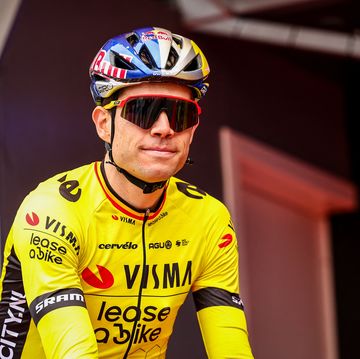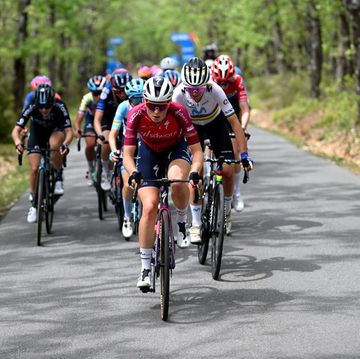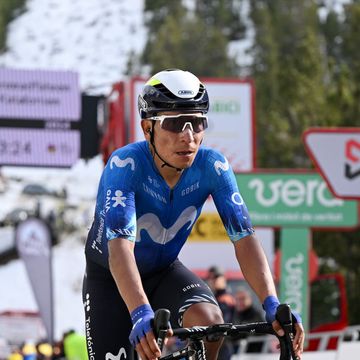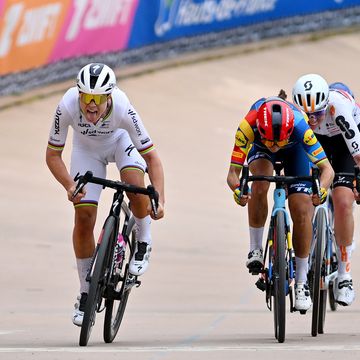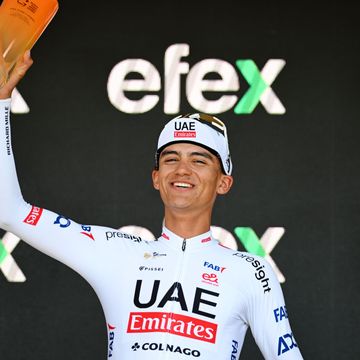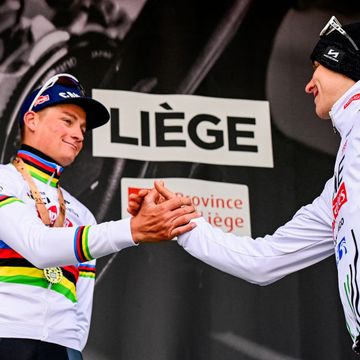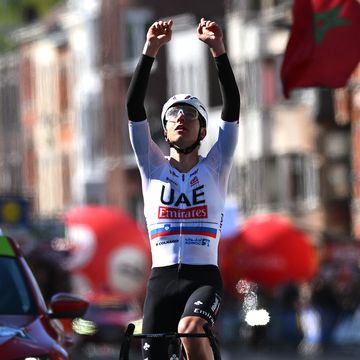But with last year’s merger of Belgium’s top two sponsors—Omega Pharma and Quick-Step—Lefevere now leads one of the peloton’s most powerful all-around teams, and results have come quickly.
American Levi Leipheimer, one of Lefevere’s star recruits for 2012, won the recent Tour de San Luis in Argentina; hardman Tom Boonen took his fourth Tour of Qatar and second in Omloop Het Nieuwsblad; and Slovakia’s Peter Velits snagged the Tour of Oman. With the Belgian Classics season under way, Bicycling caught up with Lefevere to talk about the metamorphosis of his team.
Bicycling: You’ve been getting a lot of requests for interviews lately.
Patrick Lefevere: Yeah, it’s like everybody is rediscovering us.
Bicycling: One reason must be that your team is winning stage races. You’re considered by many to be the greatest Classics director in the sport, but stage racing has never been a real focus.
Lefevere: It’s definitely good for the morale to win all these races so early in the season, but cycling is like school: You have to evaluate performances after each semester, all year long. You need to evaluate performances after the Classics, after the Tour de France, and again at the end of the season. But yes, I’m happy.
Bicycling: It wasn’t that long ago that Quick-Step was sitting at the bottom of the WorldTour team rankings. That must have been strange for you, having directed some of the sport’s most successful teams going all the way back to the powerful GB-MG outfit in the early 1990s.
Lefevere: Yes—and it wasn’t a good feeling. That said, there were reasons for that situation; both Tom Boonen and Sylvain Chavanel were injured. But there were also reasons like budget, of course. Everything revolves around the budget. It’s mathematics.
Bicycling: There have been a lot of big-budget teams and mergers in recent years that have allowed a single team to possess a wealth of talent. At the end of 2011 you orchestrated an impressive merger between Omega Pharma and Quick-Step while picking up a lot of riders and staff from the disbanded HTC-Highroad team.
The move has allowed you to have a tremendous Classics team but also a top stage-race squad. Was there a point where you realized that if you wanted to remain at the top you needed to increase your budget and develop your team in different directions?
Lefevere: You know, I had one of those super-teams with Mapei and again with the early years of Quick-Step, but then I had to let go of a lot of riders, such as (Filippo) Pozzato, (Luca) Paolini, and that was like a football team losing its midfield. But cycling is like that, and people forget quickly. Two years ago we had a fantastic Tour de France; Sylvain Chavanel won two stages and wore the yellow jersey, and Jérôme Pineau had the polka-dot jersey for a while. But that was two years ago. Last year was not a good year.
Bicycling: Can you compare the budgets of the legendary Mapei outfit and the Omega Pharma–Quick-Step team this year?
Lefevere: I don’t talk anymore about budgets, because it gets misinterpreted too often. But I have a good budget this year. Zdeněk Bakala (owner of Omega Pharma–Quick-Step) wants to build one of the top teams in the next three years. And I hope this is only the start.
Bicycling: Until now you have been known to many as Mr. Classics. But you’ve hired several riders with real stage-race potential, such as Tony Martin, Peter Velits, and, of course, Levi Leipheimer. Was there a sudden change of heart or desire to try something different?
Lefevere: There were a couple of factors. With the new UCI points system, the Classics riders are actually discriminated against. But if you look at the podiums of the big tours in the past, there was always some trouble, and I didn’t want to be involved in that. But times are changing, and with the biological passport system, I think it’s increasingly possible to ride well in the major tours clean.
Bicycling: Have you spoken with Leipheimer, Velits, and Martin about who will lead the team in the Grand Tours? We know Martin, for one, has the Olympic Games in London in his sights.
Lefevere: Yes, Tony has other goals this year but, no, we really haven’t discussed it that much.
Bicycling: So going into the Tour, is Leipheimer the logical leader?
Lefevere: He’s always competitive, but he’s 38, and so you never know when he may have an off day. Your recovery level is just not the same with age. So you hope it comes on the rest day! But I was talking to Johan Bruyneel recently and he said to me, “You don’t have to worry about Levi. He’ll be there when he needs to be there.”
Bicycling: Leipheimer has finished third in the Tour de France, and this year there are nearly 100 kilometers of time-trialing. It looks like a great race for him.
Lefevere: Yes, it’s going to be a different Tour. There’s no more Contador, for one. And so all the pressure should be on the RadioShack-Nissan team.
Bicycling: And just how good can Velits be? He just won the Tour of Oman, and he finished second two years ago in the Tour of Spain (Editor’s note: Velits placed third, but second-placed Ezequiel Mosquera was later disqualified for a doping offense), although he did have a bad Tour de France last year.
Lefevere: He can be very good. Getting (second) in the Tour of Spain is a big result. He’s young (26), so we don’t really know his limits. But not only did he get (second) in the Vuelta, he also won two individual time trials, so he really has potential. Those are promising results. But to be honest, I don’t know him that well. That said, he is off to a great start, and hopefully it’s only the antipasto of even better things to come.
Bicycling: Tom Boonen is coming off two mediocre, injury-filled years, but he just won the Tour of Qatar for the fourth time and he finished second at Omloop Het Nieuwsblad. Is Boonen back?
Lefevere: It’s funny that everybody is saying that he’s back, because he was never gone. He was injured. Personally, I never had doubts—otherwise I wouldn’t have kept him on the team. But what impresses me most about him these days is that he always has a smile on his face. And when you’re happy it’s easier to find the motivation to train hard and make the added effort needed to win.


